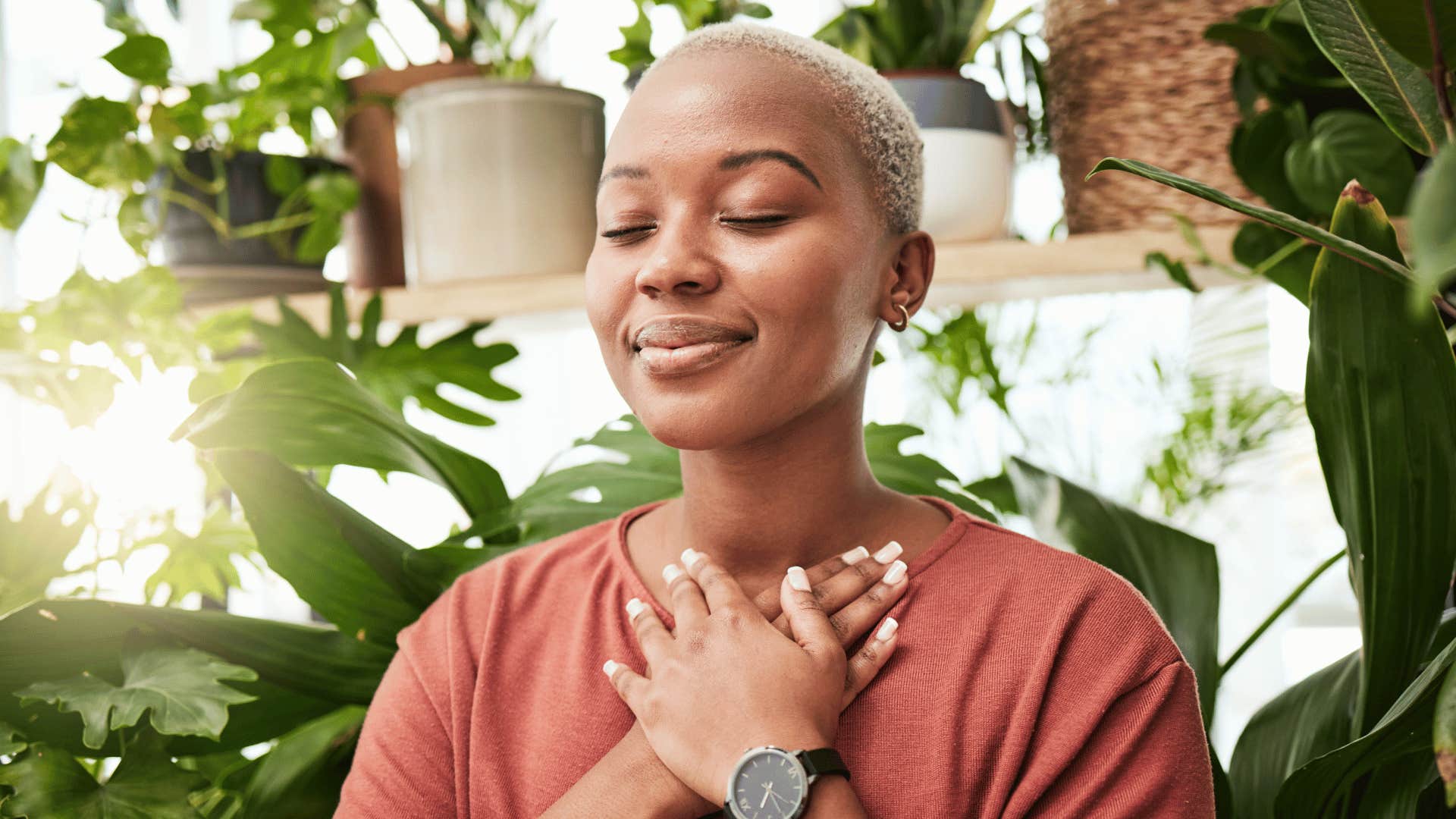If You've Experienced These 11 Things, You're Luckier Than An Average Person
You're a winner in the game of life, baby.
 insta_photos / Shutterstock
insta_photos / Shutterstock Luck is an elusive and subjective concept. One person's definition of luck will vary greatly from what another person believes. Some people see luck in terms of what they have or don’t have. They’ll describe themselves as lucky if they get their dream job or make a six-figure salary, and they consider themselves unlucky without those things. People also define luck through their relationships with others. They’re either lucky in love, or they’re not, making them destined to be alone forever.
Most people tend to think of luck as a stable trait. You’ve either got it or you don’t. Yet a big part of luck is perspective and how you see yourself in the larger scheme of the universe. While an unlucky person thinks that losing their job is a sign of how bad their luck is, a lucky person sees that same situation as an indication that they’re ready to embrace whatever changes are coming their way. However you define success and happiness, if you’ve experienced these things, you’re luckier than an average person.
If you’ve experienced these 11 things, you’re luckier than an average person
1. You've had an emotionally supportive family
 imtmphoto | Shutterstock
imtmphoto | Shutterstock
If you have an emotionally supportive family, you’re luckier than an average person. All too often, people are raised in families where they don’t feel safe as their authentic selves. They have transactional parents who take more than they give, or they have hyper-critical parents who equate love with reaching standards that are set impossibly high. Having a family who sees you for who you are and accepts you with their whole hearts means you’re luckier than an average person.
It’s easy to stay stuck in toxic family patterns. As life and career management consultant Ruth Schimel points out, “Families are complex mixes of joys, opportunities, and conflict.”
She notes that within many families, there are “unaddressed resentments, misunderstandings, and unpleasant realities, gull of repeated patterns of behavior that keep people static, often frustrated, and unrealized, perhaps adrift.” Yet family conflicts don’t always lead to estrangement, and learning how to open up and hold space for each other can help families heal.
Schimel shares touchpoints people can use to “reset communication for a more authentic family connection.”
“Effective, sincere processes of communication are key to improving situations and progress,” Schimel explains, noting that being connected to your family often means being emotionally vulnerable in a way you might not be used to.
“What do you want to say to a family member to open a door to more authentic, productive communication?” she asks, recommending that people “start by exposing something about yourself, your concerns, or your feelings.”
There’s no such thing as a perfect family, but having a family who gives you unconditional support and love without any strings attached shows just how lucky you are.
2. You’re in good health
 PeopleImages.com - Yuri A. | Shutterstock
PeopleImages.com - Yuri A. | Shutterstock
Being physically and psychologically healthy means you’re luckier than an average person. So much of our health is out of our control, determined by genes that we didn’t pick for ourselves. What’s healthy for one person doesn’t always fit someone else’s view of health, but feeling good in your body and having mental health support are things that show you’re luckier than an average person.
Being the healthiest version of yourself requires you to tap into how you want to live on a day to day basis. This might mean cutting caffeine out of your diet or it might mean drinking a cup of coffee in your robe and slippers every morning before work. It might mean walking quietly in the woods or running through a crowded city or dancing alone in your living room.
Our bodies and minds are inherently connected, which is why taking a holistic approach to your health is so important. When you’re in good health, whatever that means to you, you’re luckier than an average person.
3. You have financial security
 Ground Picture | Shutterstock
Ground Picture | Shutterstock
If you’ve experienced financial security, you’re luckier than an average person. The economy is a force out of our control, as witnessed by the recent rise in inflation as wages stay stagnant. While money can buy happiness or love, it makes it possible to put food on the table and live in comfort. Having financial security is a sign of luck, while having financial literacy rests on many complex factors, including how you were raised to think about money.
Certified financial coach Pegi Burdick reveals, “How we spend money and why is not random. It comes from issues in our childhood. Some of these are visible, such as never having received an allowance. Others are more subtle like messages about feeling unworthy."
“Feeling undeserving is one of the biggest distorted belief systems we inherit,” she shares.
Burdick helps people disconnect feelings of shame from their spending habits, noting that taking ownership of your debt and eliminating non-essential spending can bring people to more secure ground.
“Only through thinking ahead can you harness your spending and give yourself the control you need to eliminate anxiety about your finances,” she concludes.
4. You have access to education
 Ground Picture | Shutterstock
Ground Picture | Shutterstock
If you've had access to education, you’re luckier than an average person. Getting the opportunity to go pursue higher education and having the funds to get through school are an indication of how lucky you are. Many highly intelligent people don’t have direct access to a college or graduate level education, which are two factors that can determine a person’s career path and income.
Devoting time to learning and expanding your worldview is a privilege, one that’s not awarded to everyone. Yet going to college isn’t the only path to success or gaining a new perspective. While some generations, like millennials, were taught that college was the only way forward, younger generations, like Gen Z, are forging a new way ahead, without necessarily getting a college degree.
When it comes to Gen Z, 40% don’t equate getting a college degree with future success, which means they’re exploring other ways to educate themselves, like getting vocational training so they can score a high-paying blue collar job.
According to the Pew Research Center, 49% of Americans say it’s less important now than it was in the past to get a college degree in order to land a well-paying job, 47% believe that going to a four-year college is only worth the cost if you don’t have to take out loans and go into major debt to do so, 22% said that college is worth it, even with loans, and 29% said that a college education isn’t worth the price tag at all.
Whatever a person’s view is on the connection between college and their future career, spending four years learning about the world and examining your place within it is a true gift.
5. You have nourishing friendships
 Jose Calsina | Shutterstock
Jose Calsina | Shutterstock
If you’ve experienced deep, lasting friendships, you’re luckier than an average person. Making friends isn’t easy, especially as you leave childhood behind. In your journey to find people who will stay in your lives forever, you’re bound to meet some fake friends along the way, yet that pain pales in comparison to the love and nourishment a true friendship holds.
According to psychology professor Julianne Holt-Lunstad, PhD, having friends is a matter of life and death.
“When people are low in social connection — because of isolation, loneliness, or poor-quality relationships — they face an increased risk of premature death,” she explains.
Strong social connections predict a long, fulfilling life. There have been 38 worldwide research studies proving that the support provided by high-quality adult friendships protects against major mental health issues, like anxiety and depression.
Having even just one amazing friend can change the course of your life. There’s something magical to talking for hours about nothing and laughing so hard you can’t remember why you started. If you have friendships that nourish your soul and make your heart feel full, you’re luckier than an average person.
6. You’ve traveled the world
 maxbelchenko | Shutterstock
maxbelchenko | Shutterstock
If you’ve traveled, whether it’s somewhere close to home or halfway around the world, you’re luckier than an average person. Travel is a definitively life-altering experience, and not everyone has the resources to access it. Seeing a different part of the world than the one you live in pushes you out of your comfort zone, literally and figuratively.
Going to a place you’ve never been before can be mind-blowing. Traveling is fun and exciting, and it also serves an even larger purpose: it allows us to meet strangers and witness how they live, an act that inevitably reveals our common humanity. It’s easy to keep people we don’t know in rigidly-defined boxes, but traveling bridges a gap between worlds, letting us see how similar our hearts really are.
7. You’re in a healthy romantic relationship
 fizkes | Shutterstock
fizkes | Shutterstock
If you’ve experienced a healthy romantic relationship, you’re luckier than an average person. We’re taught from a young age that falling in love is a fairy tale– Just wait for that one special person to sweep you off your feet and carry you to your happily ever after. But in reality, we quickly learn that successful partnerships take work, and nourishing, healthy love isn’t a given.
Life coach Mitzi Bockmann says that a crucial step to having a healthy relationship when nobody taught you how to is believing that you deserve love. She touches on the ways having an insecure attachment style can derail a relationship, asking, “Do you believe you deserve to be loved? Do you let in partners who want to love you or push them away in favor of partners who treat you poorly? Do you worry your partner will leave you because you aren’t good enough?”
Bockmann reveals the ultimate truth: we are all deserving of love. It doesn’t matter that you are flawed and imperfect. It doesn’t matter that your family of origin didn’t model what healthy love looks like. What matters is that you’re here and you’re you, and that’s entirely enough.
8. You have help when you need it
 Josep Suria | Shutterstock
Josep Suria | Shutterstock
If you can get help when you need it, you’re luckier than an average person. It could be something small, like getting a ride to the airport or it could be help with something more serious, like having someone offer to watch your kids when you go to work or organize a meal train when you’re sick. Community support isn’t a guarantee, and if you have it, you’re luckier than an average person.
Getting out of your own head and asking for help can be hard, but Xuan Zhao, a social psychologist at Stanford University, shares that people are more willing to help out than we imagine.
“There are several common reasons why people struggle to ask for help,” she says. “Some people may fear that asking for help would make them appear incompetent, weak, or inferior… Others may be concerned about burdening and inconveniencing others.”
“These concerns may feel more relevant in some contexts than others, but they are all very relatable and very human,” she adds. “The good news is those concerns are oftentimes exaggerated and mistaken.”
Zhao explains that throughout her research, “We consistently observed that help-seekers underestimated how willing strangers – and even friends – would be to help them and how positive helpers would feel afterward, and overestimated how inconvenienced helpers would feel.”
“People want to help, but they can’t help if they don’t know someone is suffering or struggling, or what the other person needs and how to help effectively,” she concludes.
Zhao’s research shows that it’s entirely normal to feel awkward and embarrassed by asking for help, yet most people are willing to extend themselves to others, which is a very lucky thing.
9. You can follow your passions
 Rido | Shutterstock
Rido | Shutterstock
If you’re able to pursue your passion projects, you’re luckier than an average person. Oftentimes, the challenges of getting through a day in one piece hold us back from doing what we really love. There are bills to pay and meals to be made. There are emails to send and meetings to sit through, and all these things are enough to drain anyone’s energy and limit their capacity for following their passions.
Having the time and space to do what you want, just for yourself, means you’re luckier than an average person. As life coach Ronnie Ann Ryan explains, “The end goal of self-care is to show yourself love. When you take time just for yourself, you are demonstrating self-love.”
“If you do a creative project, you allow that part of your mind the freedom of expression so you are heard at least by yourself. All self-care options lead to honoring the unique being you are, your right to exist, take care of yourself, and make yourself happy,” she concludes.
10. You have stable housing
 fast-stock | Shutterstock
fast-stock | Shutterstock
If you’ve experienced having a stable place to live, you’re luckier than an average person. Having a roof over your head and a sense of physical safety is essential for survival, and people who don’t have secure housing struggle to survive, let alone thrive.
A study published in the journal “Pediatrics” looked into the effects of housing insecurity on adolescent health and well-being. Researchers followed participants starting at age one until age 15, defining three trajectories of housing insecurity: secure, moderately insecure, and highly insecure. They found that adolescents experiencing moderate and highly insecure housing had decreased odds of being in good health, along with reporting significantly higher symptoms of anxiety.
Safety and a soft place to land are rights that everyone should be able to rely on, but too many people in this world don’t have a home to call their own. If you do have a home, you can focus on flourishing, which makes you luckier than an average person.
11. You feel content with your life
 mavo | Shutterstock
mavo | Shutterstock
If you’ve experienced being content with your life, you’re luckier than an average person. Happiness can be hard to achieve and the weight of our struggles can bury us. It’s a lucky thing to be satisfied with the particular path you’re traveling along, yet part of that luck and sense of contentment comes from how you see your place in the world.
According to psychology professor Richard Wiseman, how lucky or unlucky you are is rooted in your perspective and the actions you take. While unlucky people might feel like they can’t ever catch a break, ““lucky people are always in the right place at the right time,” Wiseman notes. “I think a big part of that, not all of it, but a big part of it is the way in which they’re thinking and where they’re behaving.”
Wiseman reveals that people who believe in their own good luck tend to see that belief play out in their lives. When it comes to hitting a roadblock or a rough time, “the lucky people knew how to bounce back. The unlucky ones tended to get dragged down by that failure,” he explains.
Wiseman shares small, actionable steps anyone can take to make themselves feel lucky, starting with writing a gratitude list and recognizing all the ways you were lucky at the end of each week.
He also says that luck depends on “being a flexible thinker and having a flexible approach to life.”
“Anything like that will mean you’re more open to opportunities when they come along. So these are very simple things everyone can do, but they have quite a large impact,” he concludes.
Making your own luck involves seeing yourself as worthy, which is the foundation of anyone’s success.
Alexandra Blogier, MFA, is a staff writer who covers psychology, social issues, relationships, self-help topics, and human interest stories.

